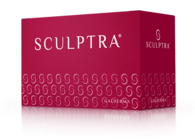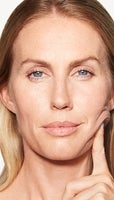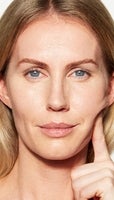Achieve the look you envision by speaking to
a healthcare practitioner today.
THE FIRST PROVEN REGENERATIVE
BIOSTIMULATOR TREATMENT1-6
Do you think your skin doesn’t look or feel like it used to? Over time, multiple factors can lead to a decline in our skin’s appearance, due to loss of collagen and elastin.7-11 The good thing is, Sculptra®, the first proven regenerative biostimulator,
can treat all of these concerns.1-6

Sculptra is a unique regenerative biostimulator that is made with the plant-based PLLA-SCA™ formulation.1-6 The treatment stimulates the production of our own collagen and elastin, meaning that Sculptra has regenerative properties leading to a rejuvenated skin.5,6,12-16
Look better and feel better with skin that feels like you again—for a long time. People are still satisfied with Sculptra more than 2 years after their treatment.17,18
Increase in type I collagen at 3 months, the most important collagen in relation to skin aging13
Patients who said their skin still looked better 2
years later17

As we age, our skin will lose some of its natural collagen and elastin. Our face will lose fullness and the skin will start to sag.7-11 But no need to despair!
By stimulating the production of collagen and elastin, Sculptra will progressively restore our skin’s firmness, radiance and volume.13-19




Achieve the look you envision by speaking to
a healthcare practitioner today.
1. Sculptra. Instructions for Use EU 2021. 2. Galderma Receives FDA Approval for New SCULPTRA® Label, Offering More Options to Aesthetic Partners. Galderma. 2021. Available from: https://www.galderma.com/news/galderma-receives-fda-approvalnew-sculptra-label-offering-more-options-aesthetic-partners [Last accessed June 2024]. 3. Asius J, et al. US patent US 7,731,758 B22(010):2010. 4. Sanofi S.r.l. DEKRA EN ISO 13485:2016 Certificate. Certificate effective since: February 2023. 5. Zhang Y, et al. Regen Biomater 2021;8(5):rbab042.
6. Widgerow A, et al. A randomized, comparative study describing the gene signatures of poly-l-lactic acid (PLLA-SCA) and calcium hydroxylapaptite (CaHA) in the treatment of nasolabial folds. Poster presented at the International Master Course on Aging Science (IMCAS) World Congress. 1–3 February 2024. 7. Hexsel D, et al. Dermatol Surg. 2020;46(8):1122–4.
8. Vierkötter A, Krutmann J. Dermatoendocrinol. 2012;4(3):227–31. 9. Zhang S, Duan E. Cell Transplantation. 2018;27(5):729–38.10. Aziz J, et al. Skin Pharmacol Physiol. 2016;29(4):190–203. 11. Swift A, et al, Aesthet Surg J. 2021;41(10):1107–19. 12. Data on File (MA-54104). 13. Goldberg D, et al. Dermatol Surg. 2013;39(6):915–22. 14. Mest DR, Humble G. Dermatol. Surg. 2006;32(11):1336–45. 15. Bohnert K, et al. Plast Reconstr Surg 2019;45(5):718–24. 16. Filho CDSM, et al. Surg Cosmet Dermatol. 2013;5(4):345–50. 17. Fabi S, et al. Effectiveness and safety of correction of cheek wrinkles. Poster presented at the International Master Course on Aging Science (IMCAS) World Congress. 26–28 January 2023. Paris, France. 18. Fabi S, et al. Skin movement and volume changes with poly-L lactic acid (PLLA-SCA) injectable implant. Poster presented at the International Master Course on Aging Science (IMCAS) World Congress. 26–28 January 2023. Paris, France. 19. Data on file (MA-48331).
Always consult a healthcare professional for individualized treatment recommendations and to discuss important safety information and risks associated with the use of the products.